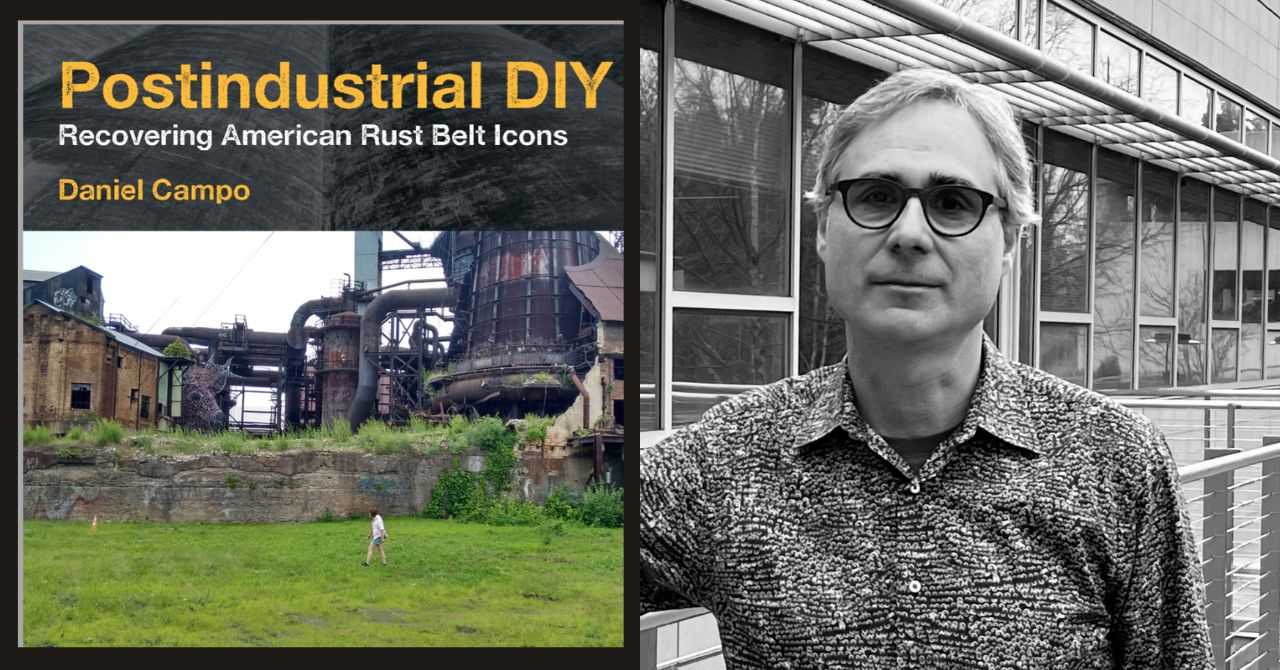- Cafe
- Bookstore
- Upcoming events
- Book an event
- Catering
- Institutional and bulk sales
- About Red Emma's
- Press
- Buy gift cards
- Red Emma's merch
- Donate to the Red Emma's Education Fund

Daniel Campo presents "Postindustrial DIY: Recovering American Rust Belt Icons" in conversation w/Fred Scharmen
This event has already happened.
A pioneering Detroit automobile factory. A legendary iron mill at the edge of Pittsburgh. A campus of concrete grain elevators in Buffalo. Two monumental train stations, one in Buffalo, the other in Detroit. These once-noble sites have since fallen from their towering grace. As local elected leaders did everything they could to destroy what was left of these places, citizens saw beauty and utility in these industrial ruins and felt compelled to act. POSTINDUSTRIAL DIY tells their stories.
The culmination of more than a dozen years of on-the-ground investigation, ethnography, and historical analysis, author and urbanist Daniel Campo immerses the reader in this postindustrial landscape, weaving the perspectives of dozens of DIY protagonists as well as architects, planners, and preservationists. Working without capital, expertise, and sometimes permission in a milieu dominated by powerful political and economic interests, these do-it-yourself actors are driven by passion and a sense of civic duty rather than by profit or political expediency. They have craftily remade these sites into collective preservation projects and democratic grounds for arts and culture, environmental engagement, regional celebrations, itinerant play, and in-the-moment constructions. Their projects are generating excitement about the prospect of Rust Belt life, even as they often remain invisible to the uninformed passerby and fall short of professional preservation or environmental reclamation standards.
Demonstrating that there is no such thing as a site that is “too far gone” to save or reuse, POSTINDUSTRIAL DIY is rich with case studies that demonstrate how great architecture is not simply for the elites or the wealthy. The citizen preservationists and urbanists described in this book offer looser, more playful, and often more publicly satisfying alternatives to the development practices that have transformed iconic sites into expensive real estate or a clean slate for the next profitable endeavor. Transcending the disciplinary boundaries of architecture, historic preservation, city planning, and landscape architecture, POSTINDUSTRIAL DIY suggests new ways to engage, adapt, and preserve architecturally compelling sites and bottom-up strategies for Rust Belt revival.
Daniel Campo, Ph.D., is an urbanist and Associate Professor and Chair of the Department of Graduate Built Environment Studies in the School of Architecture and Planning at Morgan State University. He also serves as the Director of Morgan’s Graduate Program in City and Regional Planning. He is the author of THE ACCIDENTAL PLAYGROUND: BROOKLYN WATERFRONT NARRATIVES OF THE UNDESIGNED AND UNPLANNED (Fordham). He was previously a planner for the New York City Department of City Planning.
Fred Scharmen is Program Director & Associate Professor, Graduate Program In Architecture at Morgan State University and the co-founder of the Working Group on Adaptive Systems, an art and design consultancy based in Baltimore, Maryland. His work as a designer and researcher is about how we imagine new spaces for future worlds, and about who is invited into them. In 2022, he co-founded Brick Moon, a consultancy for space habitat design. Scharmen's first book, SPACE SETTLEMENTS, was published in 2019 by Columbia University Press. His second book, SPACE FORCES, was published in 2021 by Verso. His work has been exhibited internationally, at the Venice Architecture Biennale, and the Museum of the Future in Dubai. His writing has been published in the Journal of Architectural Education, Log, CLOG, Volume, and Domus. His architectural criticism has appeared in the The Architect’s Newspaper, and in the local alt-weekly Baltimore City Paper.

